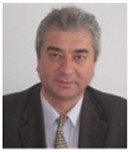
Plenary Lecture
Extremum Seeking Control Applied to Different Renewable Energy Sources

Professor Nicu Bizon
Faculty of Electronics, Communication and Computers
University of Pitesti
Romania
E-mail: nicu.bizon@upit.ro
Abstract: In this presentation, a Maximum Power Point Tracking (MPPT) technique is proposed for the different Renewable Energy Source (RES) based on advanced Extremum Seeking (aES) control that slightly improves the performances obtained in comparison with other MPPT control scheme. The analysis made for the aES control scheme reveals interesting relationships in frequency domain to design the control parameters, the values of closed loop gain and the dither amplitude. Thus, the imposed performances related to the search speed and tracking accuracy are easy to be obtained for the ES control based on a band pass filter (BPF) scheme.
The search speed will increase proportionally with the product of both control parameters, so it is practically limited for safe reasons, and the tracking accuracy will be proportional with the magnitude of the first power harmonic, so the power ripple will be negligible after the MPP is caught. Simulations show that the performances mentioned above are effective for the aES control based on BPF scheme, and the dither persistence is improved for the BPF scheme having a large frequencies band that cover at least six harmonics.
As it is known, the P&O method and its improved variants are most used algorithms that are implemented in MPP tracking controllers. The P&O methods are based on periodically changing of the RES operating point, observing the resulting change in the RES power. It is obvious that lower oscillations obtained during the MPPT phase decreases the RES power harvested.
Also, although MPPT control is a well established algorithm, certain instability may appear when the control parameters change rapidly, as happens in the effort to increase the overall RES efficiency applied in the Hybrid Power Sources (HPS) that have implemented a load-following control. Thus, an optimal management of all HPS subsystems to load dynamic is required.
Brief Biography of the Speaker: Nicu BIZON received a five-year degree in electronic engineering from the University “Polytechnic” of Bucharest, Romania, in 1986, and the PhD degree in Automatic Systems and Control from the same university, in 1996. Firstly, he was in hardware design with the Dacia Renault SA, Romania. Currently, he is Professor with the University of Pitesti, Romania, being from 2012 the dean of the Faculty of Electronics, Communication and Computers. Also, he was head of University Research Department (2004-2008) and Executive Director of the Research Centre "Modeling and simulation processes and systems" (2008-2012), being manager of two research project in field of Green and Hydrogen Energy, and team’s member in other four projects in the same research field.
He is editor of six books in field of Green Energy, Hybrid Power Sources and Power Converters. His current research interests include the broad area of nonlinear systems, on both dynamics and control applied in the Green Energy field (www.researcherid.com/rid/B-8523-2011). He was authored or co-authored of several papers (over to 150) in journals (ISI web of knowledge or data base indexed) or international conferences proceedings.
He has expertise in field of renewable energy, being evaluator of Research Projects for FP7 Programme , EVAL-INCO Programme, EACI Programme, NSRF 2007-13 (Greece), NEWFELPRO 2013-17 (Croatia), CNCSIS Ideas and ANCS PN II Programme (Romania).